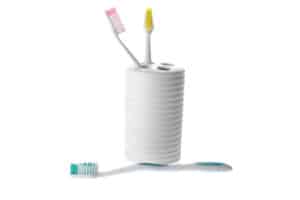
Good oral hygiene is important for everyone, but it’s especially important for seniors. Maintaining good oral hygiene can help seniors keep any natural teeth they have healthy. It is also the key to preventing dental infections.
Dental infections are very serious because they can travel through the bloodstream to other parts of the body and cause health emergencies like heart attacks and strokes. As they age, seniors may have difficulty keeping up a good dental hygiene routine. Often, seniors find it difficult to grip a toothbrush or remove the small caps on tubes of toothpaste. Flossing can be very difficult for seniors who have tremors, arthritis, or poor manual dexterity.
Personal care at home services is a great way for seniors with oral hygiene problems to get back to healthy daily practices. With personal care at home, seniors will have the help they need for all kinds of hygiene tasks, such as bathing, brushing their hair, brushing their teeth, and getting dressed.
With personal care at home, seniors can use these tips to improve their oral hygiene and their overall health:
Use an Electric Toothbrush
Electric toothbrushes can be easier to use than traditional manual brushes, particularly for seniors with limited dexterity or mobility. The rotating bristles of an electric toothbrush can help remove plaque and food particles more effectively, requiring less manual effort. Electric toothbrushes are often recommended by dentists.
Assistive Devices
Seniors who have difficulty holding a toothbrush may benefit from assistive devices such as adaptive toothbrush grips or handles. These devices provide a larger, easier-to-grip handle, making it easier for seniors to maneuver the toothbrush and brush their teeth effectively. These adaptive handles are easy to find and make a big difference for seniors struggling to grip things.
Modify Brushing Technique
Seniors who have trouble brushing may benefit from modifying their brushing technique. Instead of vigorous back-and-forth brushing motions, they can use gentle circular motions to clean the teeth and gums thoroughly while minimizing strain on the hands and wrists.
Use Toothpaste with Fluoride
Using a toothpaste containing fluoride can help strengthen tooth enamel and prevent tooth decay. Seniors should choose a fluoride toothpaste recommended by their dentist and use it regularly as part of their oral hygiene routine.
Flossing or Interdental Brushes
In addition to brushing, flossing or using interdental brushes is essential for removing plaque and food particles from between the teeth and along the gumline. Seniors who have difficulty using traditional floss may find interdental brushes or floss picks easier to handle. A personal care at home caregiver can help seniors use flossing brushes to make sure they don’t drop them.
Rinse with Mouthwash
Rinsing with an antimicrobial mouthwash can help reduce bacteria in the mouth and freshen your breath. Seniors should choose a mouthwash that is alcohol-free and gentle on sensitive gums. Mouthwash can be particularly beneficial for seniors who have difficulty brushing or flossing effectively. Your mom or dad’s dentist should be able to recommend a high-quality antibacterial mouthwash for them to use.
Regular Dental Check-Ups
Seniors should visit their dentist regularly for check-ups and professional cleanings. Dental professionals can identify any oral health issues early on and provide personalized recommendations for maintaining good oral hygiene. Seniors should get professional dental cleanings at least once a year, and seniors who have health conditions like diabetes may need them twice a year.
Personal care at home caregivers can help seniors schedule dental appointments and offer transportation help to ensure they get their regular dental check-ups.
If you or an aging loved one are considering Personal Care at Home in Atherton, CA, please contact the caring staff at Aviva In-Home Care today at (415) 463-1400
Aviva In-Home Care provides exceptional senior home care in the Bay Area, including San Francisco, Burlingame, San Mateo, Hillsborough, Atherton, Menlo Park, Palo Alto, Berkeley, Lafayette, Orinda, and surrounding areas.
- How To Help Your Senior Parent Feel Their Best Every Day - May 14, 2025
- Preventing Falls in the Yard - May 6, 2025
- Reducing the Risk of Sarcopenia (muscle loss) in the Elderly - April 22, 2025



